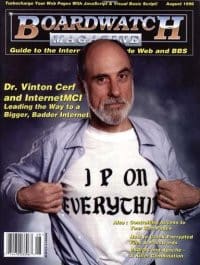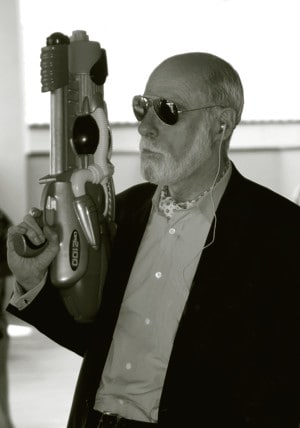Vint Cerf is an Internet Pioneer. As one of the fathers of the Internet, he likely needs little introduction, so I’ll be brief: In addition to co-designing TCP/IP, he has written or contributed to 43 IETF RFCs. In 1992 he helped found the Internet Society (ISOC). From 2000 to 2007 Vint served as the chairman of the board of ICANN. He is now Chief Internet Evangelist at Google, a member of the ARIN board, and too much more to list. Vint recently granted me the great honor of a short interview and I’d like to share his thoughts with you here now:
dp: How do you describe the Internet to someone who has never experienced it?
VC: Depends on whether you are trying to say what it is like to use or how it works. I usually begin the latter discussion with an analogy to “electronic postcards” or a “road system”. The cars are like packets in the net and they can carry anything in digital form.
As to using the Internet, the diversity of applications is almost impossible to describe. It is like every known medium of communication rolled up into one giant system.
dp: What was your first experience with a computer?
VC: I had a chance to visit a SAGE installation in 1958 at System Development Corporation and programmed a Bendix G-15 using paper tape in 1960 at UCLA.
dp: What was your first experience with the Internet?
VC: Hah, well, since Bob Kahn and I invented it, you might say it was grappling with the basic concepts and refining them in our first published paper, “A Protocol for packet network intercommunication” in the May 1974 IEEE Transactions on Communications.
My first tests with implementations came in early-mid 1975 after having spent all of 1974 working with graduate students, international visitors and others on details of TCP. See RFC 675.
The system was tested with the packet radio and packet satellite networks during 1976-1982 and put into formal operation on January 1, 1983.
dp: Well, that makes the next question an easy one: What was the first involvement you had with Internet technology development?
VC: Bob Kahn and I began discussing the design in Spring 1973.
dp: OK, what was the first involvement you had with Internet policy development?
VC: Well, since I joined ARPA in 1976 and ran the Internet program until late 1982, you could say that I led policy for all of that time. By 1986, after developing MCI Mail, I returned to research with Bob Kahn at the Corporation for National Research Initiatives (CNRI) and got involved again with the Internet Architecture Board that had policy oversight for the technology. The National Science Foundation had become deeply involved in the development of a major new backbone, NSFNET, and I served as advisor to NSF on policy.
dp: Another easy one: What has been, in your opinion, your most significant contribution to the Internet so far?
VC: Well, inventing it in the first place with Bob Kahn.
dp: And a little tougher: What is your biggest regret (so far), wrt your involvement with the development of the Internet?
VC: The continuing challenge to keep the network open and free of repressive efforts by authoritarian governments or to keep it from being captured by anti-competitive private sector actors or to keep it from being overtaken by inter-governmental forces led by the ITU.
dp: How do you use the Internet today?
VC: I think I use Google more than anything else to find things.
 dp: What do you see as the next big thing for the Internet?
dp: What do you see as the next big thing for the Internet?
VC: The IPv6 roll out, the Internet of Things, increasing use of AI for translation, sharing of major scientific databases, ….
dp: Where do you see the Internet taking us in 10 years?
VC: 80% of the worlds population (about 6 billion) will likely be online, many via mobiles. I hope more fiber will provide higher speed access. The interplanetary system will be operational at least between earth and mars.
dp: IP on Mars, very cool. So what are you working on today?
VC: The design of an interstellar spacecraft to reach the nearest star in 100 years (DARPA project).
dp: Wow! OK, what should folks just getting into Internet technology be focusing on?
VC: Improving security and safety, improving high speed access and throughput (there is a bufferbloat problem to be solved), incorporating broadcast capability into the architecture, adding new appliances to the network.
dp: And what should folks getting started in Internet policy be focusing on?
VC: Keeping the internet open for evolution and use; improving user safety and user practices; resisting authoritarian attempts to suppress freedom of speech and assembly on the net.
dp: Is there something out there that will dwarf the Internet in terms of its impact on society?
VC: Probably; but I don’t know what it is. Perhaps neural electronics?
dp: Thanks Vint!



Love the article – I’d ask him one question – if he had one thing to change on the internet what would it be?
Good stuff